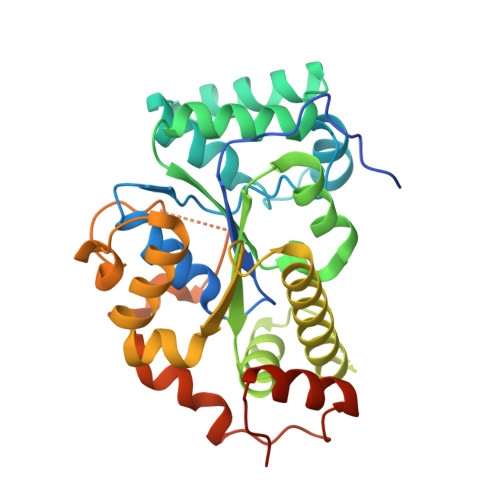Structural basis of functional group activation by sulfotransferases in complex metabolic pathways.
McCarthy, J.G., Eisman, E.B., Kulkarni, S., Gerwick, L., Gerwick, W.H., Wipf, P., Sherman, D.H., Smith, J.L.(2012) ACS Chem Biol 7: 1994-2003
- PubMed: 22991895
- DOI: https://doi.org/10.1021/cb300385m
- Primary Citation of Related Structures:
4GBM, 4GOX - PubMed Abstract:
Sulfated molecules with diverse functions are common in biology, but sulfonation as a method to activate a metabolite for chemical catalysis is rare. Catalytic activity was characterized and crystal structures were determined for two such "activating" sulfotransferases (STs) that sulfonate β-hydroxyacyl thioester substrates. The CurM polyketide synthase (PKS) ST domain from the curacin A biosynthetic pathway of Moorea producens and the olefin synthase (OLS) ST from a hydrocarbon-producing system of Synechococcus PCC 7002 both occur as a unique acyl carrier protein (ACP), ST, and thioesterase (TE) tridomain within a larger polypeptide. During pathway termination, these cyanobacterial systems introduce a terminal double bond into the β-hydroxyacyl-ACP-linked substrate by the combined action of the ST and TE. Under in vitro conditions, CurM PKS ST and OLS ST acted on β-hydroxy fatty acyl-ACP substrates; however, OLS ST was not reactive toward analogues of the natural PKS ST substrate bearing a C5-methoxy substituent. The crystal structures of CurM ST and OLS ST revealed that they are members of a distinct protein family relative to other prokaryotic and eukaryotic sulfotransferases. A common binding site for the sulfonate donor 3'-phosphoadenosine-5'-phosphosulfate was visualized in complexes with the product 3'-phosphoadenosine-5'-phosphate. Critical functions for several conserved amino acids in the active site were confirmed by site-directed mutagenesis, including a proposed glutamate catalytic base. A dynamic active-site flap unique to the "activating" ST family affects substrate selectivity and product formation, based on the activities of chimeras of the PKS and OLS STs with exchanged active-site flaps.
- Life Sciences Institute and Department of Biological Chemistry, University of Michigan, Ann Arbor, MI 48109, USA.
Organizational Affiliation:

















